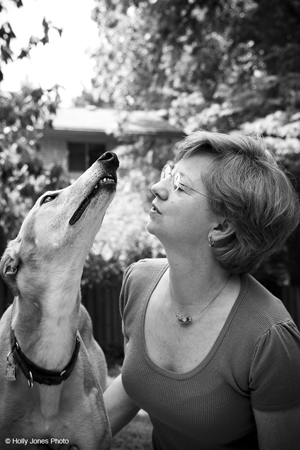 |
| Juanita and Roll |
Your dog's vaccination schedule depends on several factors: the age and health of your pet, and conditions in your dog's environment. Vaccinations protect your dog from many infectious diseases.
BORDETELLA is a bacterial infection often present when a dog has "Kennel Cough." This vaccination is generally given intranasally.
CORONA VIRUS is a very contagious disease of the intestinal tract.
DISTEMPER is a highly contagious, often fatal disease. It usually affects the respiratory, nervous, and intestinal systems, and is especially dangerous to puppies.
HEPATITIS is an infectious disease of the liver.
LEPTOSPIROSIS is a bacterial infection that causes kidney disease. It is transmitted by rodents.
PARAINFLUENZA is an upper respiratory infection that causes "Kennel Cough." Healthy adult dogs usually recovery from it. Puppies and older dogs are at risk of serious complications.
PARVO is an often fatal disease of the intestinal tract.
LYME DISEASE is a complex disease that affects the immune system. This disease is transmitted by ticks, and affects wild and domestic animals as well as humans.
RABIES is caused by a virus that attacks the brain. It is prevalent in wildlife such as raccoons, skunks, foxes, and bats. Rabies is readily transmissible to humans and pets by the bites of an infected animal.
Some vaccinations are mixed so your dog does not have to receive separate shots for each disease. Example: DHLP-P (commonly known as a "5 in 1") refers to a mixture against Distemper, Hepatitis, Leptospirosis, Parainfluenza, and Parvo.
 |
| Christian and Mildred |
Your cat's vaccination schedule depends on several factors: the age and health of your pet, and conditions in your cat's environment. Vaccinations protect your cat from many infectious diseases.
CALICI VIRUS INFECTION can cause sneezing, fever, loss of appetite, inflammation around the eyes and ulcers in the mouth. Healthy adult cats usually recover from it. Kittens and older cats are at greater risk of serious complications.
FELINE LEUKEMIA (FeLV) is caused by the Feline Leukemia Virus. FeLV is one of the most common causes of illness and death in cats. It is a cancer-causing virus that can suppress the cat's ability to fight infections. Kittens can be born with the virus. Cats can have the virus for years before showing symptoms. We recommend that your cat be tested for FeLV prior to receiving an FeLV vaccination.
FELINE IMMUNODEFICIENCY VIRUS (FIV or Feline Aids) is a major cause of illness and death in cats. It is typically spread when one cat bites another. Rarely does an infected mother infect her kittens. Signs of disease may not become apparent until weeks, months, or even years after they first become infected with FIV.
FELINE INFECTIOUS PERITONITIS (FIP) is a viral infection that is progressive and fatal. It is a serious problem in many catteries and multi-cat households.
PANLEUKOPENIA (Feline Distemper) is a highly contagious, often fatal disease, and is especially dangerous to kittens. Symptoms include loss of appetite, vomiting, diarrhea, high fever, and depression.
RHINOTRACHEITIS is like the common cold in people, but it can cause serious problems for kittens and older cats. It causes sneezing, fever, loss of appetite, inflammation around the eyes, and ulcers in the mouth.
PNEUMONITIS in cats is caused by Chlamydia psittaci. Symptoms are similar to those of calici virus infection and rhinotracheitis.
RABIES is caused by a virus that attacks the brain. It is prevalent in wildlife such as raccoons, skunks, foxes, and bats. Rabies is readily transmissible to humans and pets by the bites of an infected animal.
Some vaccinations are mixed so your cat does not have to receive separate shots for each disease. Example: FVRCPP is a mixture feline vaccination (FV) to protect against Feline Rhinotracheitis (R), Calici Virus (C), Pneumonitis (P), and Panleukopenia (P).


